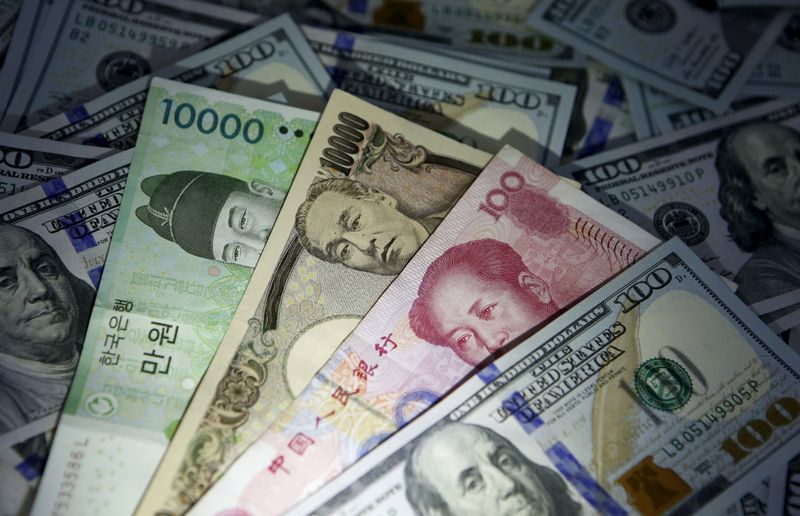
FILE PHOTO: South Korean won, Chinese yuan and Japanese yen notes are seen on U.S. 100 dollar notes in this picture illustration taken in Seoul, South Korea, December 15, 2015. REUTERS/Kim Hong-Ji
July 22, 2021
By Kevin Buckland
TOKYO (Reuters) – The safe-harbour U.S. dollar and yen were on the back foot on Thursday, after pulling back from multi-month highs amid a recovery in risk appetite as strong earnings lifted Wall Street stocks.
Cryptocurrencies held gains after Tesla Inc CEO Elon Musk said the company would “most likely” resume accepting bitcoin for payment.
The dollar index, which measures the currency against six major peers, stood at 92.770 after pulling back from a 3 1/2-month high of 93.194 touched on Wednesday.
The yen traded at 129.950 per euro, from an almost four-month top of 128.610 earlier this week, and at 81.07 to Australia’s dollar, from a 5 1/2-month peak of 79.85.
“Strong earnings have swept away Delta concerns in the U.S.,” weighing on haven currencies, National Australia Bank analyst Tapas Strickland wrote in a note to clients.
“The consensus is that (the Delta strain) does not pose an immediate risk to the recovery,” delaying reopening by three months at the most as countries ramp up vaccination drives in response, he said.
Sterling traded at $1.3717, recovering from a 5 1/2-month trough of $1.35725 reached on Tuesday, despite rising Delta variant cases in Britain and confusion about the lifting of restrictions in England.
The Aussie changed hands at $0.7350, from an eight-month low of $0.72895 the previous day, even as coronavirus cases spiked despite half the Australian population being under lockdown.
The euro stood at $1.1789, rising off Wednesday’s 3-1/2-month low of $1.1752 ahead of a closely watched European Central Bank policy decision later in the global day.
Policymakers will implement for the first time changes to their strategy and are all but certain to promise an even longer period of stimulus to make good on its commitment to boost inflation.
Analysts generally see ECB dovishness weakening the euro over the medium-term.
“On balance, the ECB’s new inflation target suggests monetary policy will remain ultra‑accommodative for an even longer period of time,” which will act as a headwind for the euro, Commonwealth Bank of Australia strategists Kim Mundy and Carol Kong wrote in a research note.
“Indeed, we expect the ECB will be one of the last central banks under our coverage to tighten policy.”
In cryptocurrencies, bitcoin held Wednesday’s 7.9% jump – the biggest since mid-June – to trade just north of$32,000.
Rival ether traded slightly below $2,000 following a 12% surge.
(Reporting by Kevin Buckland; Editing by Sam Holmes)
